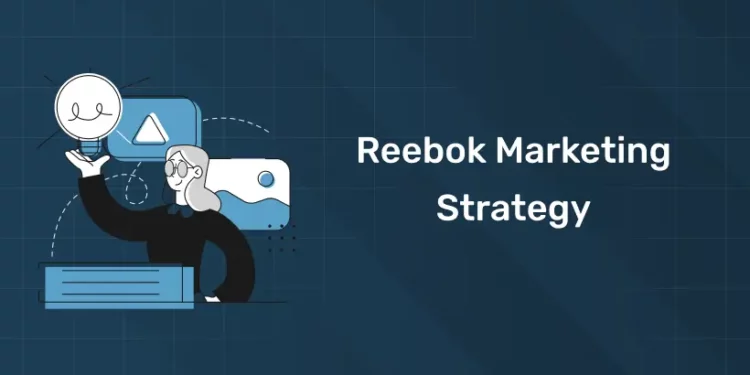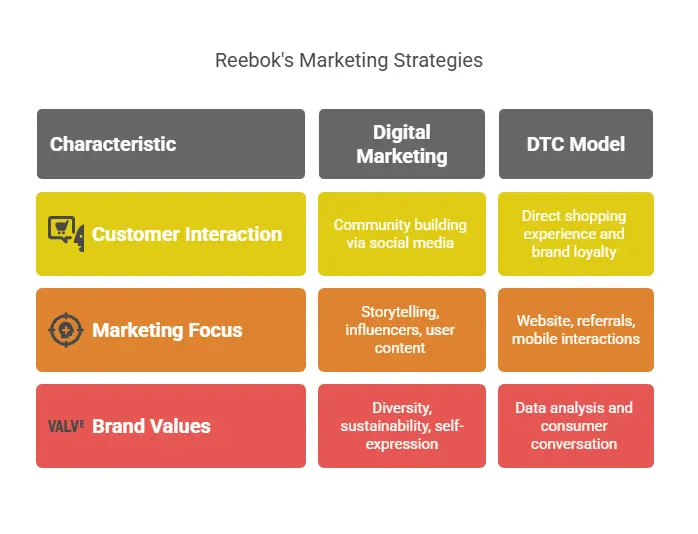Table of Contents
Within the cutthroat sporting apparel culture where competition is intense and dedicated customers exist, companies must innovate while remaining rooted in their heritage. Reebok has managed to make itself a distinctive brand through its blend of tradition, innovation, and shrewd marketing; the brand immediately comes to mind with sport and fitness for generations. Reebok, which was a minor sports footwear organization in the middle of the twentieth century, has grown to become a globally well-known and favored organization based on its sponsorship of icons, cultural applicability, and authority alignments. In this article, let’s explore Reebok’s marketing strategy.
Producing excellent products is not sufficient in the present over-saturated online marketplace. Beyond securing its share of the market,Reebok’s marketing strategy is also effective at distinguishing the brand from market competition such as Adidas and Nike. Reebok held its niche in a rapidly changing consumer world by sustaining digital presence through retro narratives and cause-related campaigns. How does it accomplish this? We will just have to wait and see.
Achieve exceptional results with Digital marketing techniques! Enroll Here!
Overview of Reebok’s History and Global Position
Reebok was originally established in 1958 in the United Kingdom and became world-famous in the 1980s, particularly during the aerobics boom. It was popularized in America with legendary releases such as the Freestyle and the Pump. Bought by Adidas in 2006 and later Authentic Brands Group in 2021, Reebok has experienced incredible makeovers.
Reebok holds a special niche in sportswear globally today. It cannot rival its parent rivals in size of revenues, perhaps, but in heritage, originality, and cultural significance, it is to be reckoned as a force and a power that must be wrestled with, particularly for those consumers who are actively engaged in fitness and lifestyle.
Brand Heritage and Legacy
Heritage is one of Reebok’s most powerful assets. It has been doubling down on its rich fitness and sports heritage to remain authentic to itself. Reebok was a fitness phenomenon in the 1980s with the Freestyle, a shoe built from the ground up for women, and shook up the market with The Pump in the early 1990s, a technological breakthrough that provided athletes with a personalized fit.
Campaigns such as “Because Life is Not a Spectator Sport” and “Be More Human” have solidified its position as a brand promoting self-expression, empowerment, and fitness overall—not sport. Reebok continues to tap into its roots through fresh reinterpretations of heritage silhouettes, combining retro cool with the sensibilities of fashion today.
Digital Innovation and E-Commerce Strategy
1: What is the primary goal of SEO (Search Engine Optimization)?
Today, Reebok has increased its operations with forceful digital marketing and e-commerce strategies in the internet era. The company actively interacts with customers on platforms such as Instagram, TikTok, and YouTube using storytelling, influencer marketing, and user-generated content to create a community and stimulate conversations.
The direct-to-consumer (DTC) model by Reebok has also been a core component of its strategy. Through a simple and accessible website, client referrals, and fluid mobile interactions, the company prompts the customers to shop directly from Reebok as opposed to other third-party distributors. It not only fosters brand loyalty but also makes Reebok better understand and converse with consumers via insights garnered through data analysis.
Today’s online campaigns have also emphasized diversity, sustainability, and self-expression, and so the brand relates to today’s consumerism.
Become an AI-powered Digital Marketing Expert
Master AI-Driven Digital Marketing: Learn Core Skills and Tools to Lead the Industry!
Explore CourseStrategic Collaborations and Partnerships
Reebok’s brand philosophy lives off of strong partnerships that support it. Athlete, influencer, and organizational partnerships are now a bridging of performance and lifestyle.
A star quality example is Reebok’s collaboration with the WNBA and athletic celebrities like Angel Reese, who embody strength, confidence, and modern athleticism. These collaborations are more than endorsements—these are narrative vehicles that resonate across diverse communities and enhance Reebok’s visibility in sports and popular culture.
Reebok has also partnered with cultural leaders, musicians, and fashion designers, such as Cardi B, Pyer Moss, Shaquille O’Neal, and Allen Iverson. Additionally, collaborations between Reebok and fashion brands and street style influencers keep Reebok buoyant and current in the saturated lifestyle space.
Achieve exceptional results with Digital marketing techniques! Enroll Here!
Product Innovation and Inclusivity
Reebok is quite specific about their product innovation pledge. From sports to street style, Reebok strives to target a broad range of consumers based on sizes, gender, and sporting level.
Especially in disadvantaged communities, the “Not Made to Be Subtle” campaign—a confidence, self-expression, and individuality campaign—is one of its best campaigns. The company contradicts traditional beauty tips in its advertising and espouses body acceptance.
Reebok is a powerful message transmitted with adaptable equipment, bigger sizes, and diversity casting in television ads: everyone can get dressed and work out.
Reebok Newsroom
Product launches, brand news, and social impact project updates have a common ground in the Reebok Newsroom. It spotlights Reebok’s initiative in community, sustainability, and diversity—offering an openness and thus reaffirming the company’s values.
From educating individuals about athlete stories to releasing eco-friendly collections, the newsroom is a reflection of Reebok’s story and PR strategy, thus making its message clear, timely, and consistent.
Become an AI-powered Digital Marketing Expert
Master AI-Driven Digital Marketing: Learn Core Skills and Tools to Lead the Industry!
Explore CourseFinal Thoughts
Reebok’s marketing strategy is an embodiment of thoughtful balance between heritage, today, and tomorrow. Reebok continues to demonstrate relevance within a competitive market through respect for fitness heritage, building on digital transformation, producing inclusive innovation, and building meaningful partnerships.
Its approach is more about beating the competition, in a broad sense, in the sense that it actually addresses its followers—honestly, imaginatively, and with intent. The future chapter for Reebok in the global sportswear business is marked in large part by its campaign, even if the brand comes under new ownership.
| Related Links | |
| Best Cities in Kerala for Digital Marketing Jobs | Puma Marketing Strategy |
| Digital Marketing Quiz | Salary: Digital Marketing vs Software Engineer (Experts Guide) |
Frequently Asked Questions
What platforms does Reebok use for digital engagement?
Reebok is active on Instagram, TikTok, YouTube, and Twitter, using a mix of product showcases, influencer content, community campaigns, and brand storytelling.
What future trends is Reebok likely to embrace in its marketing strategy?
Reebok is expected to deepen its focus on sustainability, influencer co-creation, virtual try-ons, and AI-driven personalization in its digital and product marketing strategies.
How does Reebok leverage its brand history in marketing?
Reebok regularly revives iconic products like the Classic Leather and The Pump while referencing past campaigns to build emotional connections and brand credibility.
How has Reebok adapted to the rise of e-commerce?
Reebok has developed a strong direct-to-consumer platform, optimized mobile shopping, personalized product recommendations, and exclusive online drops to drive sales and brand loyalty.
What is the core focus of Reebok’s marketing strategy?
Reebok focuses on blending brand heritage with modern values like inclusivity, digital engagement, and strategic collaborations to connect with diverse, fitness-conscious audiences.












